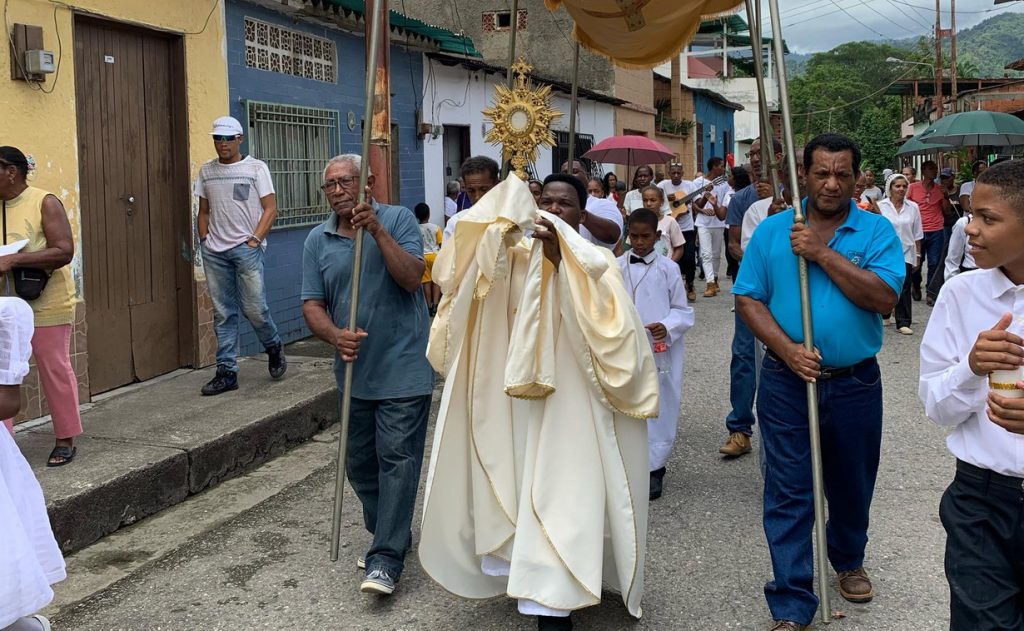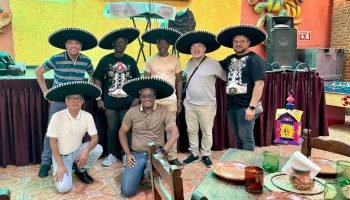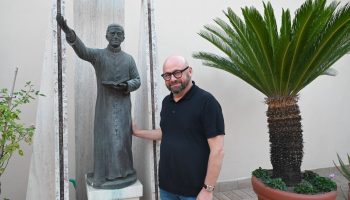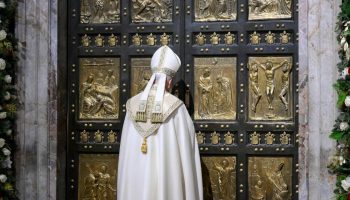
“The Jubilee 2025, an event of great significance for the Catholic Church, is being experienced in Venezuela in a particular context, marked by social and economic challenges. The Venezuelan Church has launched an appeal to live the Jubilee as a time of hope and renewal”.
By Jaime C. Patias *
This is what the Mozambican Father, Clemente Pedro Ernesto Madeira, IMC, says. He works in Barlovento, in the diocese of Guarenas (Venezuela), where the Consolata Missionaries assist four parishes: Caucagua, Panaquire, Tapipa and El Clavo.

Father Clemente was born in Alto Molócué, province of Zambésia (Moçambique), in 1983. He entered the Institute in Nampula and then studied philosophy in the seminary of Matola, on the outskirts of Maputo. After his novitiate in 2012, he went to Colombia where he studied theology in Bogotá and was ordained a deacon in Puerto Leguízamo in 2018. In 2019, he was ordained a priest in Lichinga and assigned to the mission in Venezuela.
While passing through Rome, Father Clemente gave an interview in Spanish to the Communications Office, in which he highlighted some aspects of the mission amid the difficulties that the country is experiencing in the year of the Jubilee of Hope.
“Flooding Venezuela with hope”
Father Clemente recalls that, during the opening of the Holy Door in the Metropolitan Cathedral of Caracas, the Archbishop, Monsignor Raúl Biord, emphasized the importance of ‘flooding Venezuela with hope’. “In this sense, several celebrations and pilgrimages are taking place throughout the country. In addition, the pilgrimage of the Nazarene of Saint Paul, an image of great popular devotion, has acquired a special meaning in the Jubilee. At the same time, the Venezuelan Church has emphasized the importance of living the Holy Year as a time of mercy and solidarity, especially towards those most in need”.

As we know, Venezuela is living the Jubilee in a context of social and economic tensions intensified by political controversies of the July 2024 elections when the results were contested by the opposition to the government of Nicolás Maduro, who nevertheless declared victory. “The Venezuelan Church has expressed its concern for the situation in the country and has called for peaceful solutions and dialogue,” explains Father Clemente.
The parish church Nuestra Señora de la Encarnación in Caucagua, home to the IMC community in Barlovento, has been named a “jubilee church.” It is a historic and significant church like many other temples, a place of worship and pilgrimage.

The Canonization of José Gregorio Hernández
“The news released on February 25, 2025 of the canonization of Blessed José Gregorio Hernández, the ‘doctor of the poor,’ has generated great hope and joy in Venezuela, especially at this time when the country faces significant challenges in the health sector. His elevation to the altars is seen as a symbol of hope, healing and solidarity. His example inspires many, especially doctors and health workers, to continue providing care with compassion and dedication, despite adversity. The canonization of José Gregorio is experienced as an event of profound spiritual and social significance,” emphasizes Father Clemente.

Commenting on the mission lived in the light of the charity of José Gregorio Hernández, Father Clemente observes that the Blessed doctor “teaches us that the mission is lived in contact with human needs; his life reminds us that faith translates into concrete works of love and service, which imply immersion in the reality of communities. In this sense, the mission is not only preaching words, but also healing wounds and alleviating suffering, inviting us to cultivate a compassionate heart”.

And he continues: “The Church in Venezuela welcomes missionaries and, in turn, sends them to other places. Therefore, the missionary experience in Venezuela, illuminated by the example of José Gregorio Hernández, invites missionaries from all over the world to live their vocation with a profound sense of incarnation, hope, compassion and unity”.
Father Clemente concludes by saying that “the plan of God’s love generates unconditional hope. There is no doubt that God walks among his people despite all the difficulties. In the midst of this reality there is the strength of hope. For this reason, today more than ever, Venezuelans are people who have learned to be in solidarity, to fight together because they are a people who live on hope”.
* Father Jaime C. Patias, IMC, Office of Communications.




